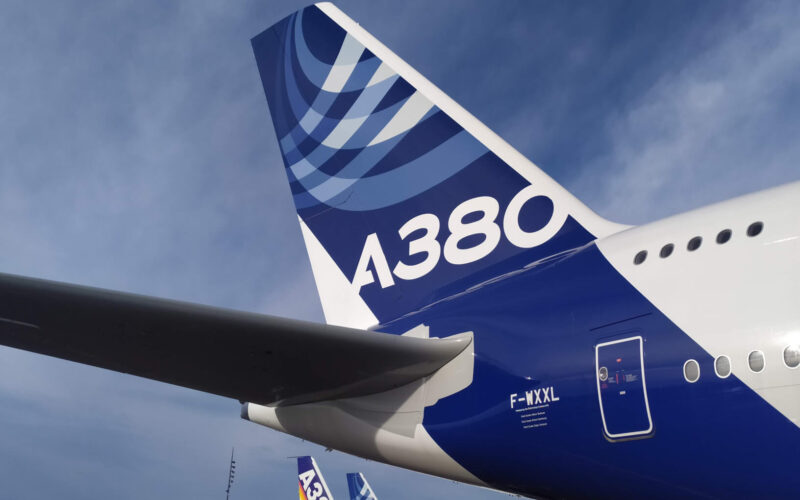This article was initially publihsed on July 30, 2020.
For Airbus, the A380 was supposed to become the flagship aircraft of the 21 century. At the start of the 2000s, the announced double-decker was supposed to take over the Boeing 747 on the royalty throne, becoming the icon of aviation throughout the next decades. Instead, it became a problem for the manufacturer.
And an expensive one, at that.
Exceptional charges
Every aviation geek will remember February 14, 2019, as a very bittersweet Valentine’s Day. As Emirates shrank its order book, Airbus had no other choice but to announce the cancellation of the production of the A380. After all, its only remaining customers at the time were All Nippon Airways (ANA) from Japan and Emirates. ANA’s backlog was small, however, as the Japanese airline ordered three of the Super Jumbos to fly between Japan and Hawaii, a very popular tourist destination for Japanese nationals.
The only customer left was the pride and joy of Dubai, Emirates. On February 14, 2019, the airline reduced its order book by 39 aircraft, leaving Airbus without any choice but to announce the cancelation of production of the A380. The last delivery is scheduled in 2021 for the aforementioned Emirates. Boeing, meanwhile, confirmed that the Boeing 747 will outlast its European Jumbo competitor, as the last Queen will roll out from the Everett plant in 2022.
Ever since the manufacturer was forced to cancel the production of the Airbus A380, the aircraft became a headache for the planemaker, including a financial one. In the same quarter, during which the double-decker was canceled, the company booked a $71.6 million (€61 million) production cost charge, and in Q2 2019, a further $88 million (€75 million). The charge was a part of “Airbus’ continuous assessment of assets recoverability and the quarterly review of onerous contract provision assumptions,” reads the press release.
Throughout 2019 and 2020 the manufacturer booked $627.5 million in charges related to the A380 program. The last time Airbus published its list prices in 2018, the A380 cost $445.6 million. Even then, the price is only indicative – airlines negotiate discounts and concessions when making orders, especially big ones. The last Emirates order that Airbus booked was for 36 aircraft (20 firm, 16 options). At list prices, the acquisition was set at $16 billion.
An unprofitable venture
While 2019 was a good year for Airbus in terms of its financial performance, except the fact it had to take a $3.8 billion (€3.5 billion) corruption charge, 2020 is a much different story. The industry is bleeding cash from the top to the bottom, including the manufacturers.
The Toulouse, France-based manufacturer finished H1 2020 with a net loss of $2.2 billion. The A380 program forced Airbus to write off $390 million in the first six months of 2020 alone.
Yet the pain of the program is not over. Out of the 14 operators, many of them have either shrank their double-decker fleets or retired them permanently. Lufthansa (LHAB) (LHA) reduced its A380 fleet by six out of its 14 Super Jumbo aircraft, while Air France phased all of them out permanently. Qatar Airways and Qantas put their A380s to long-term storage, while its largest operator, Emirates, only recently began flying them once again.
After Airbus announced that the company will cancel the production of the jet in 2021, the now-former CEO of the manufacturer Tom Enders told CNN that the bill for the A380 would be a “double-digit billion amount of money,” and even despite the constant pouring of resources into the program, “Airbus is very competitive today,” added Enders.
“It was a heavy liability. We tried hard, as I said, it did not work.”
Services
The former chief executive also indicated that the aircraft was selling “only below production cost” at an Airbus press conference in February 2019.
Nevertheless, its glimpse of hope to at least make more money on it would have been the ability to service and maintain the global fleet of the Jumbos. Mark Martin, an aerospace industry analyst, told Arabian Business in an interview that Airbus still had 20 years or so before the A380s all go to a desert to be scrapped, providing at least some service revenue.
“Unless there is a major global economic shakeout that wipes out the very need for the A380, the worldwide A380 fleet should end up in the aircraft boneyard latest by 2040.”
Unfortunately, a major shakeout did happen in the form of the COVID-19 breakout. In 2018, Airbus set out the goal to earn up to $10 billion of service revenue by 2025, tripling its 2018 result of $3.5 billion (€3 billion). In H1 2020, Airbus earned $1.5 billion (€1.3 billion) from services, including the sale of spare parts. During the same period a year prior, the result was $1.8 billion (€1.6 billion). In 2019, the manufacturer earned $3.9 billion (€3.8 billion) of revenue from its services business side.
With the global fleet of A380s shrinking, Airbus‘ opportunities to sell new, rather than used, spare parts are also shrinking. Much like its workforce as a result of the cancellation of the double-decker, as in February 2019, it indicated that between 3,000 and 3,500 employees would be affected over the next three years. While Enders stated that the company is hopeful to redeploy these employees, the current crisis might have shifted those plans massively.

